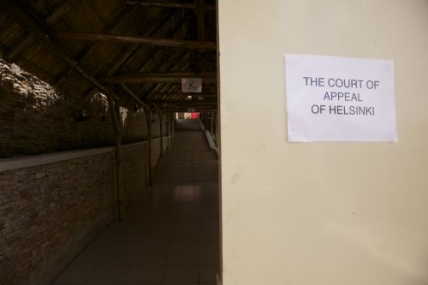Genocide and international politics at Gasworks
Model Court, a British collective composed of the artists and researchers Lawrence Abu Hamdan, Sidsel Meineche Hansen, Lorenzo Pezzani and Oliver Rees, will present their Resolution 978 HD starting on May 10 at Gasworks, in London.
The collective focuses on the trial of François Bazaramba, who was found guilty of the 1994 genocide of over 800,000 people in Rwanda. While working as a preacher at a local Baptist church, Bazaramba was accused of encouraging the ethnic cleansing inflicted by the Hutu militia on the Tutsi population.
After Bazaramba’s request for political asylum in Porvoo, Finland was accepted, the local court adhered strictly to the principle of universal jurisdiction, by which crimes against humanity can be tried outside of their geopolitical boundaries, in accordance with international law. Based on the principle of non-refoulement, Bazaramba was not allowed to be tried in his native country; instead, he had an unprecedented videoconference trial. Thus, Finnish judges and prosecutors set about collecting statements in Rwanda and Tanzania by establishing temporary courts, while Bazaramba was tried for his crimes in Finland.
The piece of work presents itself as an inquiry into the intervention of a local Finnish court in such a culturally and geographically distant society. Resolution is not meant to discuss Rwanda’s political organization or François Bazaramba’s guiltiness, but rather to tell the story of the transposition of Finland’s legal system to Rwandan territory, looking into the notion of “international justice” and its application in Africa – as of then the only continent ever investigated by an international criminal court.
On addressing the spatial, aesthetical, and geopolitical aspects of the legal procedures for the case, in Resolution 978 HD the Model Court collective questions the extent to which the emerging technologies employed in those actions geographically reorient the legal process and the conventions of testimony. The end result is a hybrid piece combining languages such as film, installation, and public events. In tandem with the installation, the film questions notions of international aid, neo-colonialism and the production of history from the perspective of the technician who set up the broadcasting systems for the trial.
Gasworks is a London-based organization known for scouting new local and international talent. Its program of residencies, shows, events and international projects is a landmark in new content research and production, amplifying the output of innovative emerging artists. Learn more about Gasworks and its projects at the organization’s website.

